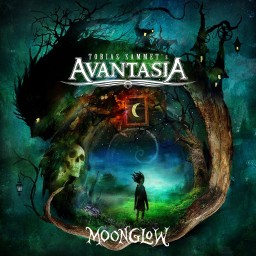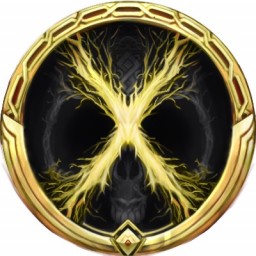Reviews list for Avantasia - Moonglow (2019)
It’s been three years since Tobias Sammet has gotten the project Avantasia back into the studio. And the last time he did it, he created Ghostlights, an album that I still go back with regularity to this day, and an album that I would consider to be one of the best albums overall during 2016. Of course Tobias has never not failed to impress me with his songwriting and calling on big name collaborators, but I’m still waiting for that one album to really push me over the bar on this project; one that make me put Avantasia in the same category as Ayreon. And given the massive disappointment that was Within Temptation’s last album, I was in some desperate need for some hard hitting power metal. Did Tobias get there with Moonglow?
Well, yes and no. At points on this album, Avantasia may have made some of their best individual tracks. And that’s hard to do considering how excellent the title track from Ghostlights is. However I do feel like this album has a lot of filler material; not necessarily bad, again I don’t think Tobias could make something outright bad, but not memorable in the slightest. So yeah it’s a good album, not a great one.
So let’s start off with the performances on this album. Because a part of what will sell this album for you will be the cast members and how they are used. And this album does have a few returnees, including Jorn Lande, Michael Kiske of Helloween, Geoff Tate from Queensryche, Bob Catley and Ronnie Atkins. The new voices are Eric Martin from Mr. Big, Candice Night from Blackmore’s Night, Hansi Kürsch from Blind Guardian and Mille Petrozza from Kreator.
The last of those names was obviously the most intriguing one. How is Tobias going to incorporate a thrash metal vocalist into Avantasia? Well, look no further than the second track, “Book of Shallows”. Lots of minor harmonies and down tuned guitars make it one of this groups darkest tracks to date, but when that bridge comes in, it sounds like it was composed specifically for Mille to sing over. And the subject matter is matches his growling tone as well.
Other notable features include Candice Night providing a beautiful counterpoint to Tobias on “Moonglow”, Michael Kiske on “Requiem for a Dream” and Hansi Kürsch and Jorn Lande on “The Raven Child”, an epic track that uses dynamics and swells all throughout the first half of the track leaving you wondering when the heaviness will come back, and it leads to one of the best outros on this album.
Now the one thing that I will say about the production of the album is that too many of the singers have very similar timbres to one another and it makes it difficult to recognize one from the other unless you have a lyric sheet open in front of you. Take Geoff Tate for example. While I did enjoy the piano interlude “Invincible”, “Alchemy” had the two voices sounding almost identical to each other. Even Ronnie and Jorn sound pretty similar on “The Piper at the Gates of Dawn” or “Starlight”.
The other thing is the synthesizer choices. All of these retro, 8-bit sounding synth choices don’t make sense on an album that is supposed to be a futuristic space opera. A personal pet peeve of mine was the clicking that occured during “Moonglow”, but the stuttering synths on “Starlight” and the aforementioned faze synth “Lavender” is a big misstep.
The rest of the instrumentals hold together quite well. I like the minor harmonies and down tuned guitars on tracks like “Book of Shallows” and “Requiem for a Dream”, they seem like the thing that Tobias wanted to do on Ghostlights but never got the chance to do. The dynamics on “The Raven Child” give a feeling of epicness that I really dug. “The Piper and the Gates of Dawn” is also pretty epic in scale. And I even dig “Starlight”, despite those problems with the synths, a short and straightforward but still great sounding power metal track.
Then there’s “Maniac”, a cover of the Michael Sembello track from the movie Flashdance that was thrown onto the end of this album. In the context of the albums themes, it seems ridiculous that Tobias would include this, but at the risk of losing validity to what I’m saying, I really like this cover as a single. Tobias and Eric Martin have some decent chemistry and there harmonies flush the tune out.
Now onto the lyrics and themes. And there are a lot of passing references to Ghostlights, like on the opening track “Ghost in the Moon”. But now the protagonist is trying to escape the earthly realm that they are trapped in and wish to escape to the moon; the reasoning is that the protagonist is fearful of the light and the people who ridicule him.
This album contains a lot of references to older literature, no track more prominent of this than “The Raven Child”, which references both Edgar Allan Poe’s famous poem “The Raven” and “Karbat” by Preußler. Since the protagonist is trapped in this world, they must first learn how to fly before they can be free. And this carries on through to “Lavender”, when the protagonist is told that you will ascend to the moon like flames.
But then the stakes are brought to a screeching halt on “Requiem for a Dream”, a track which Tobias has not mentioned if it has anything to do with the movie/novel of the same name. But it brings up an interesting concept. You see, in that novel, the characters have their dreams taken away from them because of their substance abuse. And the protagonists eyes are opened to the reality that is in front of him: there is no black magic that will give him wings to escape from this world. He is trapped, permanently, in this prison until the end of days.
It’s a lot to unpack here, but Tobias manages to create this story through the words, but also the instrumentals as well. Not surprisingly, this story requires some knowledge of the works that it’s cross referencing, otherwise the concept is going to be lost in the translation, which I do appreciate, but it means that the people listening who don’t know the referenced material will be lost. I think it would be like a Coheed and Cambria album, but not trapped in its own universe.
So as a whole, look I don’t want to come on here and say that Avantasia made a dud. Because they didn’t. This is some very good, sometimes even great, power metal and Tobias always manages to pull off hiring a murderer’s row of talent. But something about this just didn’t feel right. The moments of downtime felt really down and less engaging than those of other Avantasia albums. Perhaps that’s just a result of having higher expectations. But it’s still a good album, “Book of Shallows” will probably make a best songs of 2019 list come years end, so yeah check this out.
Utmost Refinement
Tobias Sammet and his gang of all-star Heavy Metal friends are back and better than ever with another installment of the Symphonic Power Metal project Avantasia. What started out as a classical and overblown metal opera production has forged its own identity with its impressive but somewhat generic Power Metal base, drawn out and epic songwriting, colossal amounts of orchestration and symphonic elements, and use of multiple prestigious Metal vocalists. This new style created an abrupt divide in their discography as well as their fan base, with The Metal Opera Pt. I & II left behind as relics of their previous sound. With the release of The Scarecrow, The Wicked Symphony, and Angel of Babylon forming The Wicked Trilogy, Avantasia have been steadily maintaining their aforementioned style for the past ten years, with ups and downs in terms of success. I'm a huge fan of the new style much more than their old one, but with the release of Ghostlights it felt like they were beginning to run out of steam with no real alternative, since the project at this point is cemented to inevitably contain the same ideas fans have come to expect. I was apprehensive but excited coming into Moonglow and it turned out to be the increase in quality that Avantasia has desperately needed.
Moonglow is the most complete package Avantasia has ever released and while it treads on mostly familiar ground it is performed in superior fashion in every way. Although the similarities to The Wicked Trilogy and Ghostlights are there, Moonglow is much more theatrical and varied, barely using any blatant Avantasia or Power Metal clichés that have dragged down their albums in the past. Each song is memorable in its own unique way and sometimes are straight up better versions of past songs. Some tracks, namely "The Piper at the Gates of Dawn", "Requiem for a Dream", and "Starlight", do employ the overused and generic Power Metal riff that's impossible to get away from, but these tracks have so many other interesting aspects that the dull guitar work sometimes aids in providing a solid backing to these other parts. The impressive composition work that Sammet has done in this album for tracks like "The Piper at the Gates of Dawn" and "The Raven Child" use these sometimes generic rhythms to build to meaningful climaxes, creating some of the most powerful moments Avantasia has ever offered. Even the "filler" tracks have exciting and unique elements like the infectious synth rhythm in "Starlight" and the string-forward and hook-laden chorus of "Lavender". Either through maturity with the project or through pure chance, Moonglow is able to take everything that was successful about Avantasia and perfect it. The continuity of the project also shines through with Moonglow continuing many themes and topics from The Wicked Trilogy as well as using many of the same characters. Although the story may not be entirely coherent, I still think it adds just enough flair to the lyrics to go along with the larger than life Avantasia production.
Much of the Avantasia experience, at least for me, is enjoying some of the best vocalists in Metal performing together under one roof. Although the lineup has gone through some changes from Ghostlights, Moonglow is still absolutely star-studded with Geoff Tate (Queensrÿche), Ronnie Atkins (Pretty Maids), Mille Petrozza (Kreator), Michael Kiske (Helloween), Bob Cately (Magnum), Candice Night (Blackmore's Night), Eric Martin, Jorn Lande, and my personal favorite, Hansi Kürsch (Blind Guardian). Each vocalist is utilized very well and the tracks that feature multiple of them such as "Book of Shallows" and "The Raven Child" have some of the strongest vocal performances in Avantasia's history. Candice Night's duet with Sammet in "Moonglow" provides some necessary diversity and becomes extremely catchy even though it's one of the weaker tracks on the album. Even though most of these guest vocalists sing in similar styles, it's still very difficult to use all of them effectively without songs feeling bloated or pandering and Sammet has finally found the sweet spot with controlling the talent that he brings into the studio. Hansi's performance on "The Raven Child" is one I won't soon forget and is made more special in that he is only used in a few select parts throughout the album, making his appearances very effective.
The worst part about Moonglow is that it was so, so close to being a flawless Avantasia release. If the bonus track "Heart" is included (for me personally it is), the fact that the second to last track is a cover of Michael Sembello's "Maniac" is jarring and overall confusing. Sammet had said in an interview that choosing to close Moonglow with "Maniac" was out of pure love for the song, but I don't think he should have let that cloud his judgement. Although it would have easily been the weakest track on the album, "Heart" serves as a better closer following "Requiem for a Dream" than the "Maniac" cover does. Besides, if there was going to be a bonus track from the beginning, "Maniac" would have fit that bill perfectly as an awesome extra track for the other editions of the album. But alas, even though "Maniac" is a perfectly fine cover by itself, I can't agree with the decision to have it be the finale of an otherwise tremendous album.


 Saxy S
Saxy S
 Xephyr
Xephyr